Related Research Articles

William Shakespeare was an English playwright, poet and actor. He is widely regarded as the greatest writer in the English language and the world's greatest dramatist. He is often called England's national poet and the "Bard of Avon". His extant works, including collaborations, consist of some 39 plays, 154 sonnets, three long narrative poems, and a few other verses, some of uncertain authorship. His plays have been translated into every major living language and are performed more often than those of any other playwright. He remains arguably the most influential writer in the English language, and his works continue to be studied and reinterpreted.

Thomas Middleton was an English Jacobean playwright and poet. He, with John Fletcher and Ben Jonson, was among the most successful and prolific of playwrights at work in the Jacobean period, and among the few to gain equal success in comedy and tragedy. He was also a prolific writer of masques and pageants.
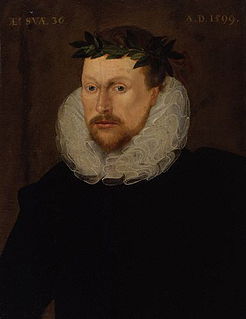
Michael Drayton was an English poet who came to prominence in the Elizabethan era. He died on 23 December 1631 in London.

Samuel Daniel (1562–1619) was an English poet, playwright and historian in the late-Elizabethan and early-Jacobean eras. He was an innovator in a wide range of literary genres. His best-known works are the sonnet cycle Delia, the epic poem The Civil Wars Between the Houses of Lancaster and York, the dialogue in verse Musophilus, and the essay on English poetry A Defense of Rhyme. He was considered one of the preeminent authors of his time and his works had a significant influence on contemporary writers, including William Shakespeare. Daniel's writings continued to influence authors for centuries after his death, especially the Romantic poets Samuel Taylor Coleridge and William Wordsworth. C. S. Lewis called Daniel "the most interesting man of letters" whom the sixteenth century produced in England.
This article lists notable literary events and publications in 1599.

Thomas Nashe was an Elizabethan playwright, poet, satirist and a significant pamphleteer. He is known for his novel The Unfortunate Traveller, his pamphlets including Pierce Penniless, and his numerous defences of the Church of England.
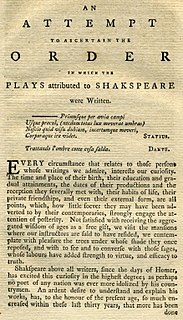
This article presents a possible chronological listing of the composition of the plays of William Shakespeare.

John Marston was an English playwright, poet and satirist during the late Elizabethan and early Jacobean periods. His career as a writer lasted only a decade. His work is remembered for its energetic and often obscure style, its contributions to the development of a distinctively Jacobean style in poetry, and its idiosyncratic vocabulary.
City comedy, also known as citizen comedy, is a genre of comedy in the English early modern theatre.

Thomas Lovell Beddoes was an English poet, dramatist and physician.

Elizabethan literature refers to bodies of work produced during the reign of Queen Elizabeth I (1558–1603), and is one of the most splendid ages of English literature. In addition to drama and the theatre, it saw a flowering of poetry, with new forms like the sonnet, the Spenserian stanza, and dramatic blank verse, as well as prose, including historical chronicles, pamphlets, and the first English novels. Major writers include William Shakespeare, Edmund Spenser, Christopher Marlowe, Richard Hooker, Ben Jonson, Philip Sidney and Thomas Kyd.
Sir Edmund Kerchever Chambers,, usually known as E. K. Chambers, was an English literary critic and Shakespearean scholar. His four-volume work on The Elizabethan Stage, published in 1923, remains a standard resource.
Like most playwrights of his period, William Shakespeare did not always write alone. A number of his surviving plays are collaborative, or were revised by others after their original composition, although the exact number is open to debate. Some of the following attributions, such as The Two Noble Kinsmen, have well-attested contemporary documentation; others, such as Titus Andronicus, are dependent on linguistic analysis by modern scholars; recent work on computer analysis of textual style has given reason to believe that parts of some of the plays ascribed to Shakespeare are actually by other writers.
The Beaumont and Fletcher folios are two large folio collections of the stage plays of John Fletcher and his collaborators. The first was issued in 1647, and the second in 1679. The two collections were important in preserving many works of English Renaissance drama.
Gary Taylor is an American academic, George Matthew Edgar Professor of English at Florida State University, author of numerous books and articles, and joint editor of The Oxford Shakespeare and The Oxford Middleton.
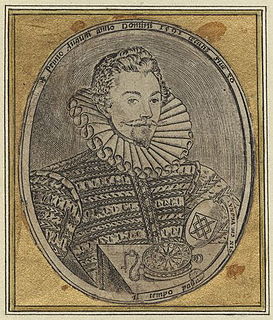
Thomas Cockson, or Coxon, was one of the earliest English engravers. He left a large number of portraits engraved entirely with the graver in a neatly and finished manner. His first and most recognizable work is one for John Harington's version of Ariosto's Orlando Furioso and his latest, one depicting musketeers and pike men, which depicts on either side the coats of arms of various captains of the time.
On 1 June 1599, John Whitgift and Richard Bancroft signed their names on an order to ban a selection of literary works. This act of censorship has become known among scholars as the "Bishops' Ban" and is one of four such acts during the reign of Elizabeth I. Debora Shuger has called the order "the most sweeping and stringent instance of early modern censorship."
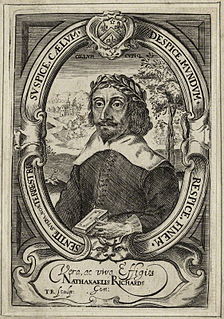
Nathanael Richards was an English dramatist and poet, perhaps from Kent. He should not be confused with Nathaniel Richards (1611–1660), a cleric.
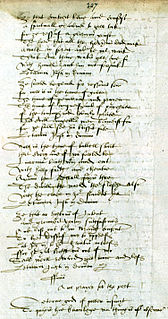
Poetry of Scotland includes all forms of verse written in Brythonic, Latin, Scottish Gaelic, Scots, French, English and Esperanto and any language in which poetry has been written within the boundaries of modern Scotland, or by Scottish people.
-mastix is a suffix derived from Ancient Greek, and used quite frequently in English literature of the 17th century, to denote a strong opponent or hater of whatever the suffix was attached to. It became common after Thomas Dekker's play Satiromastix of 1602. The word μάστιξ (mastix) translates as whip or scourge.
References
- ↑ Wall, Wendy (2007-11-22). "MICROCYNICON: SIX SNARLING SATIRES Edited by Wendy Wall". In Taylor, Gary; Lavagnino, John (eds.). Thomas Middleton, Vol. 2: Thomas Middleton and Early Modern Textual Culture: A Companion to the Collected Works: A Companion to the Collected Works. Oxford University Press. doi:10.1093/actrade/9780198185703.book.1. ISBN 978-0-19-818570-3.
- ↑ "The forgotten poet of Newington who never shied from a jibe - Southwark News" . Retrieved 2022-11-01.
- ↑ Campana, Joseph (2012-04-05). "Middleton as Poet". In Taylor, Gary; Henley, Trish Thomas (eds.). The Oxford Handbook of Thomas Middleton. Oxford University Press. doi:10.1093/oxfordhb/9780199559886.013.0030.